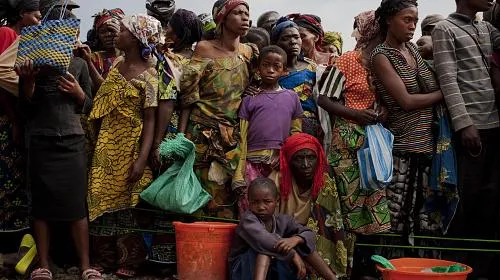KAMPALA, Uganda (Feb. 8, 2018) — Intensifying conflict and violence have driven more than 14,000 people, the large majority of them women and children, from their homes in the Democratic Republic of Congo (DRC) in the past six weeks. They have sought safety in neighboring Uganda, home already to 1.4 million refugees, most of them South Sudanese. Women and girls are particularly vulnerable to sexual violence, included repeated rapes, at the hands of armed groups.
Most of the displaced people arrive through the Bunagana border point in southwestern Uganda, but some brave the dangerous waters of Lake Albert to escape an even greater threat in the DRC. More than half of them are children.
CARE reports that one official in Uganda’s Nyakabande Transit Center estimates that nine out of 10 women fleeing the DRC are raped along the way, sometimes more than once and sometimes by gangs.
“Women, girls and civilians are hunted down by out-of-control armed groups, forced to abandon their loved ones when they cannot flee fast enough, devastated by physical and emotional pain due to assault, rape, loss of friends and families,” says Delphine Pinnault, CARE’s country director in Uganda. “The use of sexual violence against women and girls in DRC must stop. The world cannot stand and continue to watch and accept what is happening. It is high time we all come together to denounce the massive abuses and demand protection of DRC’s citizens and women and girls in particular.”
CARE staff members who conducted a rapid assessment last week explain that while initially more women sought refuge in Uganda, more men have begun arriving. Many of them are still trapped in the DRC, and droves have been executed by the armed gangs for trying to leave the country.
“The sight of my husband being killed is still fresh in my mind,” says Evelyn, who paid 60,000 Uganda shillings (US$17) to be smuggled across Lake Albert, a large sum when one lives on a dollar or two a day. “They tied his hands in his back and shot him in the head. That same day, I started planning my escape from our village. I was so scared because many people had been killed by the armed groups while trying to flee.
“Life has been extremely hard for us. Sometimes I ask myself why we had to go through these killings. We are lucky to be here but we all have families and friends still stuck in DRC.”
Refugees fleeing the DRC report that the threat includes armed groups burning down and pillaging villages, torching houses, shutting down schools, hospitals and churches, forcefully recruiting young men, abducting and kidnapping innocent citizens and raping women and girls. Many of them must leave behind disabled and elderly family members, as well as children, who are unable to run away from armed groups.
About CARE
Founded in 1945 with the creation of the CARE Package®, CARE is a leading humanitarian organization fighting global poverty. CARE places special focus on working alongside women and girls because, equipped with the proper resources, they have the power to lift whole families and entire communities out of poverty. That’s why women and girls are at the heart of CARE’s community-based efforts to improve education and health, create economic opportunity, respond to emergencies and confront hunger. Last year CARE worked in 93 countries and reached 63 million people around the world. Learn more at care.org.
Media Contacts
Brian Feagans, bfeagans@care.org; 404-979-9453
Nicole Harris, nharris@care.org, 404-735-0871

